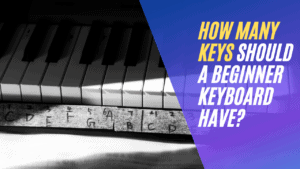How Long Does it Take to Tune a Piano?
Keeping a piano in tune is essential if you’re learning to play and you want to get the most enjoyment from your instrument. A qualified piano tuning technician can usually tune a piano in less than 1.5 hours. However, most technicians recommend an appointment of at least 2 hours to cover unforeseen circumstances.
During a piano tuning, certain adjustments may be required and there could be minor repair issues to solve. In this article, we will take a closer look at the piano tuning process and how long it should take to complete the task.
Correcting the Piano Pitch
A piano that is very sharp or flat will require a pitch correction which will take up the majority of the tuning process. The technician will bring up the pitch of the piano to A440 which is the measurement of the A note above middle C.
This process begins with a fast pass to apply the correct bearing to the soundboard. The soundboard is a section of flat wood with a small raised dome at the center which creates the deep rich tones. The next stage is the fine tuning which addresses each individual not to ensure that it’s in-tune.
The Complexity of Piano Tuning
A professional piano tuning may only take 1 or 1.5 hours or it could take as much as 2 hours to complete. This may seem like a long time, but when you understand the complexity of the task it starts to make sense. A violin only has 4 strings and a guitar has 6 or 12 strings, but a piano has more than 230 strings to tune!
So, tuning a piano is a complicated task and it requires a great deal of concentration to complete. In some cases, the piano tuner may be able to tune your instrument in less than 1 hour. This is especially true if you have an upright piano, but this is not the absolute standard.
The frequency of tuning is also an issue, if your piano hasn’t been tuned for longer than a year, it will take longer. If your piano tuner can finish the tuning in less than half an hour it’s likely that they are not doing their job correctly.
3 Tips to Keep Your Piano In-Tune
Professional piano tuning can be expensive, but you can mitigate the costs and keep your piano in-tune for longer by following these three simple tips:
- Maintain a Stable Temperature: A fluctuating temperature will have the greatest effect on the tuning of your piano. As the materials contract and expand they will affect the pitch and cause the piano to go out of tune quickly.
- Keep the Piano in One Location: When you move the piano around frequently it’s more likely to be bumped and jarred. This can change the string tension and cause the piano to lose tuning rapidly.
- Play Softly: Of course, you may want to play harder during more strident pieces of music, but that should be the exception. When you hit the keys hard you place more stress on the strings and this will cause them to go out of tune faster.
Regular piano tuning every six months will help to keep your piano in tune for longer.

